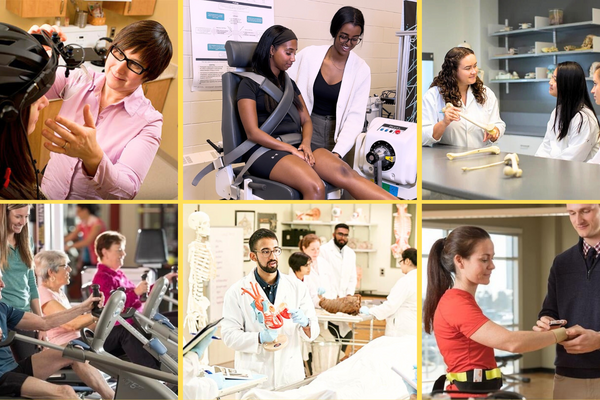
Waterloo students reducing mental health stigma with peer-to-peer support
MATES program offers support and resources to students managing mental health difficulties

MATES program offers support and resources to students managing mental health difficulties
By Taylor Legere University Relations Your education is important but it should never come at the cost of your wellbeing says student mental health advocate on campus.
Your education is important but it should never come at the cost of your wellbeing says student mental health advocate on campus.
I know that sounds terrifying to people who have put a lot of effort into it but if you need to take a term off, if you need to take a few weeks off, or even if you need to take a day off, or drop a course for your mental health then it’s going to be worth it.
- Awn Duqoum, undergraduate engineering student
Duqoum and Vaiva Dzemionas, social development studies undergraduate, are both working to improve mental health on campus and reduce stigma through their roles as coordinators for the Mentor Assistance through Education and Support (MATES) program.
MATES is a peer support program offered through Federation of Students (Feds) and counselling services that consists of 45 student volunteers. The program offers a combination of drop-in and scheduled appointments where students can talk to a peer about any personal challenges they may be facing.
Duqoum and Dzemionas hope to reduce the stigma of seeking mental health support by connecting students with resources that suit their needs and helping students grow their support systems.
“I think one of the gaps is the lack of knowledge of resources and what those resources actually do and how to access them,” said Dzemionas. “There are different misconceptions about different resources like counselling and things like that that definitely aren’t true.”
Dzemionas also emphasizes the importance of students looking out for the people around them and being mindful that not everyone’s struggles are visible.
She suggests students can reduce stigma on a more personal basis by, “asking people how they are and genuinely listening to the answer. If one of your friends is having a rough time tell them that it’s okay to feel bad, and it’s okay to seek out help.”
Duqoum became aware of the need for peer-to-peer support as a don after witnessing the challenges that many students face in residence. He’s now a member of the President's Advisory Committee on Student Mental Health and MATES to continue promoting mental health.
Duqoum expressed that professors and faculty can also play a key role in reducing the stigma around seeking mental health support.
“Being able to stand in front of your class and say, ‘If you’re struggling here is where you can get help’ means a lot to some students who are still terrified of accessing mental health resources,” said Duqoum. “If it’s something you’re not okay with but you see someone who you respect saying it’s okay you’re definitely going to have a change of heart.”
More information about mental health resources available to students are available on the Campus Wellness website.

Read more
From optometry and pharmacy to public health and therapeutics, Waterloo alumni are powering Canada’s health care sector

Read more
Here are the people and events behind some of this year’s most compelling Waterloo stories

Read more
A closer look at the University of Waterloo’s beloved network of pedestrian tunnels and bridges
The University of Waterloo acknowledges that much of our work takes place on the traditional territory of the Neutral, Anishinaabeg, and Haudenosaunee peoples. Our main campus is situated on the Haldimand Tract, the land granted to the Six Nations that includes six miles on each side of the Grand River. Our active work toward reconciliation takes place across our campuses through research, learning, teaching, and community building, and is co-ordinated within the Office of Indigenous Relations.